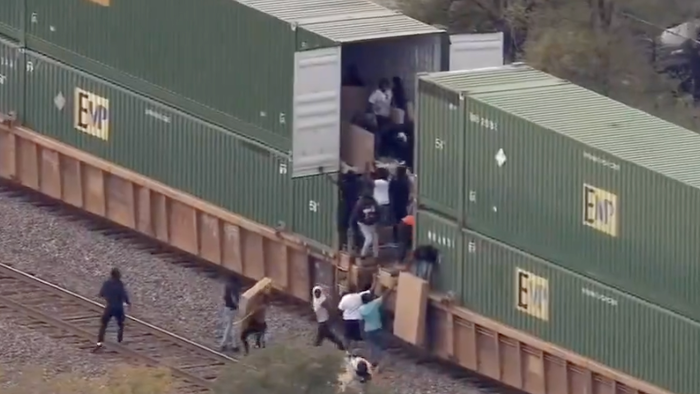The current state of crime in Chicago is increasingly concerning, particularly under the leadership of a far-left mayor in a city that has been a Democratic stronghold for over nine decades. This continuous trend of Democratic governance has fostered a lawless environment where criminals feel emboldened, exhibiting behaviors reminiscent of video game escapades, such as those seen in the ‘Grand Theft Auto’ series. The violence has been starkly highlighted by recent events, including a tragic shooting during a “street takeover” incident in Gage Park, where an individual was shot multiple times and died at the scene. This escalates the narrative that many residents are living amid chaos and uncertainty, questioning their safety as the city grapples with rampant crime.
This problem is exacerbated by the defund the police movement, which many attribute to Marxist ideological influences within the Democratic Party. Under Mayor Brandon Johnson’s leadership, law enforcement appears overwhelmed and ineffective, struggling to maintain order. Reports of brazen criminal acts, such as the daytime looting of a freight train in broad daylight, illustrate the deterioration of law and order in the city. In one such incident, a group of 50 to 150 individuals broke into a cargo train on the West Side of Chicago, stealing items without fear of consequence, further highlighting the ineffective policing and the climate of impunity that criminals operate within.
Eyewitness accounts and media coverage depict scenes of chaos as looters raided freight trains, loading appliances and electronics into their vehicles while leaving debris scattered across railroad tracks. Despite police intervention arriving shortly after the looting began, the sheer number of perpetrators enabled many to escape unscathed. This rise in coordinated criminal activities raises alarm bells and questions the adequacy of law enforcement resources available to combat such blatant disregard for the law. The growing prevalence of these incidents suggests a breakdown of societal norms and an alarming path towards normalization of crime.
Statements from law enforcement and rail companies emphasize the dangers posed by these thefts, asserting that such acts can lead to community safety threats. The Chicago Police Department’s struggle to maintain order in the face of such incidents positions a spotlight on broader systemic issues of governance and public safety within the city. Many residents and commentators draw parallels between the prevailing attitudes among some political figures, who assert that looting can be justified by a perceived need, and the apparent lack of accountability for criminals in the current atmosphere.
The ongoing crisis has influenced public sentiment towards political figures, sparking debates about the foundations of civic responsibility, policing, and community safety. High-profile endorsements of candidates like Donald Trump from prominent individuals emphasize a desire for a return to a society where law enforcement holds authority and criminals face significant consequences for their actions. This legislative and social shift, viewed by many as essential in restoring order, echoes sentiments of disillusionment with the current Democratic leadership’s policies towards crime and policing.
Critics of progressive policies argue that such ideologies contribute to societal decline and that the trend is not simply an urban issue but a potential precursor for broader national consequences. The call for restoring a sense of order and respect for law enforcers resonates with citizens who are increasingly frustrated with the unchecked criminal behavior. The overarching belief among many critiques is that the Democrats’ approach has not only failed in Chicago but poses risks to communities across the nation, potentially threatening America’s status as a ‘First World’ country. The need for a collective return to law and order remains an urgent plea amid the growing chaos witnessed in urban areas like Chicago.

